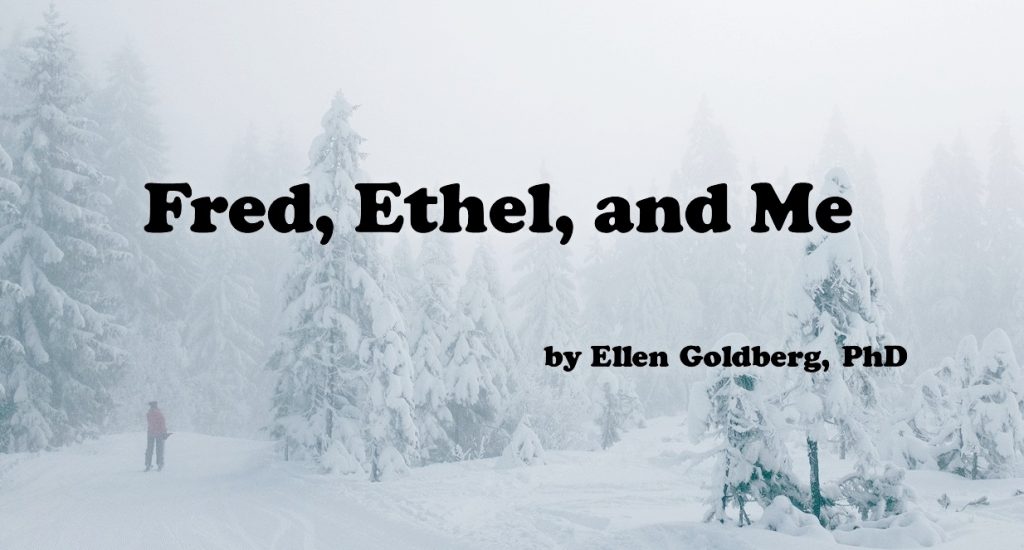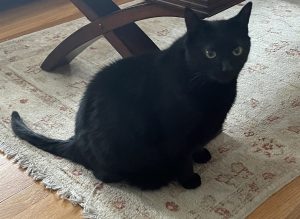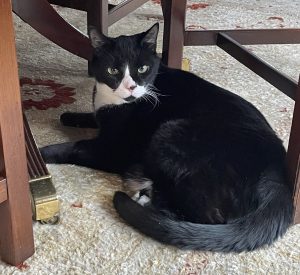
A friend was enjoying a walk through the woods behind her home when she heard a high-pitched cacophony of yipping, and yowling coming from a coyote and two baby kittens fighting for their lives. She rescued the them and I took both kittens when they were eight weeks old. They are named Fred and Ethel after my favorite characters on the I Love Lucy show. Ethel is a black small cat with slightly rough fur. She reminds me of T.S. Eliot’s Rum Tum Tugger “who is a curious cat. For he will do as he do do.” Fred is the biggest cat my vet has seen. He weighs 28 pounds. The vet said he is only two pounds overweight. I use a small dog carrier when he goes for his checkups. Fred reminds me of Eliot’s Bustopher Jones because of his girth, as well as very friendly ways.
I was working full time when the cats were little and didn’t notice they were having a party clawing my silk shades and one arm of my couch. I bought some scratching posts and had my cousin send me fresh home-grown Alaskan catnip. Although they were orgasmic over the catnip, the couch arm and the shades remained their favorites. I began to feel like Fred and Ethel owned my condo and I rented from them. For a few minutes, I considered having my cats declawed but rejected that idea. They enjoy using them. After all, how would I feel if I couldn’t have J.P. Licks Mint Chip yogurt whenever I want. So, I throw a small quilt over the couch arm when company comes and I keep my new shades up high enough so that they can’t reach them.

Psychoanalyst Jeffrey Moussaieff Masson loves cats and wrote a book about them. He has tracked the behavior of cats over a number of years and asserts that they have 9 primary emotions. They are narcissism, love, contentment, fear, anger, curiosity and playfulness, jealousy, and attachment. In addition, many cat lovers including myself, believe that cats are aware of human sadness. Of course, I can’t be sure, but when my daughter Julie died, Fred spent the entire Shiva hiding under a quilt in my bedroom and Ethel moved into a closet. I suspect they were likely scared of all the people, but in my heart, it helps to believe that they were sharing our family sorrow.
Masson also uses simple analytic language when thinking of cats (transference and projection). That’s fine, but I prefer a more playful approach when I think about Ethel and Fred. My friend Jason administered the Vineland Adaptive Behavior Scales to his Black Lab, Snapper. Jason proudly reported that Snapper had the abilities of 2.5-year-old. I knew Fred and Ethel, could not be trained in the same way. But my competitive urge kicked in. I also owned the Vineland Adaptive scales, so I decided to test Fred’s and Ethel’s object constancy. First, I rolled a ball toward two open doors. They went after the ball. The second time the ball was partially hidden between two doors. Fred walked away. Ethel looked between the doors and found the ball. The best part of this “experiment” was the fun Jason and I had arguing over who our pets’ intelligence. Despite Fred’s non-performance, I still think that my cats are smarter than Snapper.
Prior to the pandemic, Ethel often sat on the front windowsill. By the time, I unlocked the front door, both cats were standing in front of me. I have no doubt they were hungry and wanted food. But I enjoyed thinking of their greeting as their way if showing they missed me. I took pleasure in their nightly greetings and a variety of humorous and sometimes annoying antics such as climbing on my computer when working on a report.

I was on a plane flying back from a vacation in Acomal, Mexico on March 11. The plane was full. My seatmate was also from Boston and we were sharing concerns. I got home without any problems and was greeted by my cats. My condo was neat without any notable evidence of mayhem. As I was settling in, Fred went over to the refrigerator, lifted his tail and looked directly and peed. Under normal circumstances, I would have called his name in a scolding way. I decided he was likely anxious and cleaned the floor and pet him. The three of us were moving into an into an unknown way of living and Fred likely sensed our collective anxiety.
It’s not surprising that our relationship changed when during the year plus in lock down. From my perspective they spent more time with me. Fred decided my lap was his favorite place to sit. He also developed separation anxiety. Now when I go down to the basement I inevitably hear his heavy paws clumping down the stairs meowing until he sees me. When I leave, he makes a mad dash up the stair so that he is not left behind. There are many ways my cats feel more human. One of my favorite times is when Ethel climbs on the back counter and we look out the window looking for birds. It is so peaceful particularly when our small garden waterfall is running.
I am very grateful to have my cats throughout the worst of the pandemic. Evidently, many folks adopted pets for companionship and comfort. There were some worries that new pet owners may abandon or return pets to shelters. A British study from the University of York and Lincoln collected data from 5,323 homes of new pet owners, 65% percent of whom reported positive changes in their family life. Recently, an ASPCA survey found that one out of 5,020 respondents took in a cat or a dog. On a very positive note, 90% of dogs and 85% of cats stayed in their new adoptive homes.
But what about children? When I think about children who have contracted Covid because they were not vaccinated, I enter a seesawing place between furry and have a mad urge to get my son’s old baseball and throw it at my only TV. I am no stranger to death. It sits on my left shoulder so that I can be with my daughter. Sometimes I am enjoying sweet or funny memories while at other times I am just plain mad. It’s how I am. Whether we acknowledge it or not, grief is an essential part of life in all its varied shapes and forms. It is too soon to know how Covid parents will feel about the loss of their child or how siblings will understand needless deaths in the years to come. Only time will tell.
References:
Masson, J. M. (2002). The Nine Emotional Lives of Cats: A Journey into the Feline Heart. London: Jonathan Cape.
Ellen Goldberg, PhD is a Clinical Psychologist, Psychotherapist and Library Committee Member of BPSI. Her previous posts include book reviews of Born a Crime, The Nickel Boys, film essays about System Crasher and Unorthodox TV Series, as well as the review of Deborah Luepnitz’s article The Name of the Piggle. She has a private practice in Newton, MA.
Ellen Goldberg can be contacted by email here.
***
The opinions or views expressed on the Boston Psychoanalytic Society & Institute (“BPSI”) social media platforms, including, but not limited to, blogs, Facebook posts and Twitter posts, represent the thoughts of individual contributors and are not necessarily those of the Boston Psychoanalytic Society & Institute or any of its directors, officers, employees, staff, board of directors, or members. All posts on BPSI social media platforms are for informational purposes only and should not be regarded as professional advice.
BPSI does not control or guarantee the accuracy, relevance, timeliness or completeness of information contained in its contributors’ posts and/or blog entries, or found by following any linked websites. BPSI will not be liable for any damages from the display or use of information posted on its website or social media platforms. BPSI cannot and does not authorize the use of copyrighted materials contained in linked websites.

